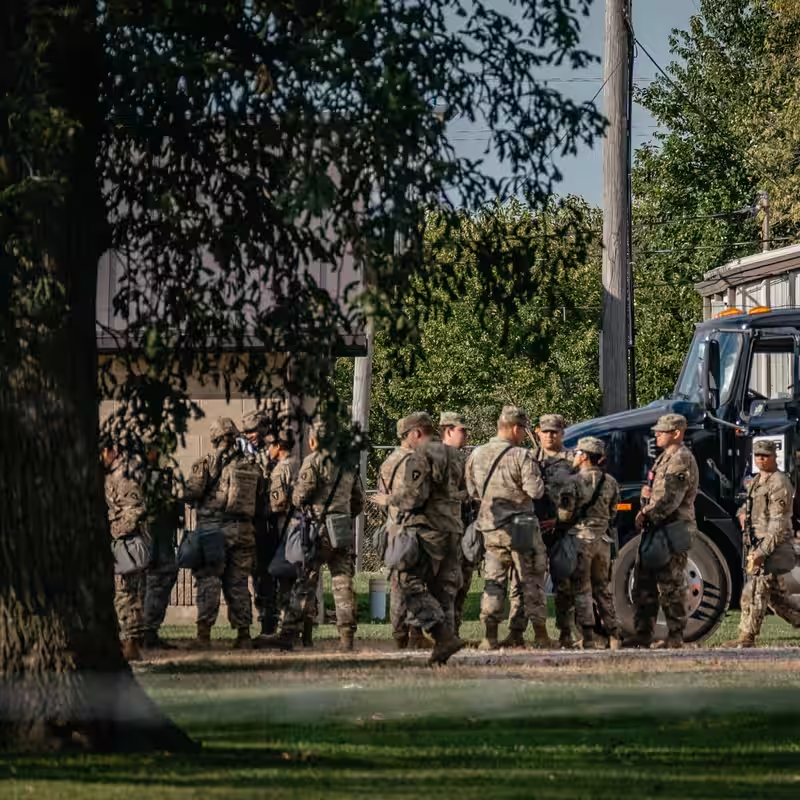For decades, U.S. governors prided themselves on rising above partisan chaos—hosting bipartisan summits, launching “disagree better” tours, and maintaining a rare spirit of cooperation even as Washington grew more divided. But that fragile unity has shattered over one controversial move: President Trump’s deployment of Texas National Guard troops to Illinois.
The decision, orchestrated with Texas Governor Greg Abbott’s approval, sent roughly 200 Texas guardsmen to the Chicago area—without Illinois Governor JB Pritzker’s consent. The fallout has been swift, bitter, and deeply personal, exposing a new fault line in American federalism.
Why Did Texas Send Troops to Illinois?
According to the Trump administration, the deployment is part of a broader initiative to “restore order” in cities perceived as struggling with crime and unrest. While no specific threat was cited, the move echoes Trump’s past rhetoric about “liberating” Democratic-run cities.
Gov. Abbott framed it as a show of support for law enforcement. But to Illinois and other blue states, it felt like something else entirely.
“Greg Abbott is a tool of Donald Trump, he’s his lackey,” Pritzker told MSNBC, calling the deployment an “invasion” of state sovereignty.
Abbott fired back on social media: “Pritzker is clueless—and scared of his own city.”
Texas National Guard Deployment: What’s at Stake?
This isn’t just a political spat. The Texas National Guard deployment raises serious constitutional questions:
- Can one state unilaterally send military personnel into another without invitation?
- Does the federal government have the authority to override state control of National Guard units?
- Is this a new precedent for partisan weaponization of state militias?
Historically, the National Guard operates under the command of a state’s governor—unless federalized by the president. In this case, Trump appears to have leveraged emergency powers to reassign Texas troops, bypassing Illinois’ chain of command entirely.
Bipartisanship in Crisis
The National Governors Association (NGA), founded over a century ago to foster cooperation, is now teetering on the edge of irrelevance. Governors Gavin Newsom (CA) and JB Pritzker (IL) have threatened to withdraw from the group, accusing Republican counterparts of enabling federal overreach.
“This isn’t about policy—it’s about respect for state autonomy,” Newsom said in a joint statement with Pritzker. “If Texas can send troops to Chicago, what stops California from sending them to Austin?”
Table: Timeline of the Governors’ Rift
| Date | Event |
|---|---|
| Early October 2025 | President Trump authorizes Texas National Guard deployment to Chicago |
| Oct. 3, 2025 | ~200 Texas troops arrive in Illinois; Pritzker calls it “unconstitutional” |
| Oct. 5, 2025 | Pritzker and Newsom threaten to leave National Governors Association |
| Oct. 7, 2025 | Abbott defends move; accuses blue-state leaders of “failing their citizens” |
| Oct. 8, 2025 | Legal scholars debate legality; no court challenge filed yet |
What Happens Next?
While no shots have been fired, the symbolic damage is profound. The Texas National Guard presence in Illinois may be small in number—but it represents a seismic shift in inter-state relations.
If unchecked, experts warn, this could normalize partisan military deployments across state lines, turning governors into proxies in a broader culture war. For now, the NGA remains silent, and the White House shows no sign of backing down.
One thing is clear: the era of governors “disagreeing better” may be over.




